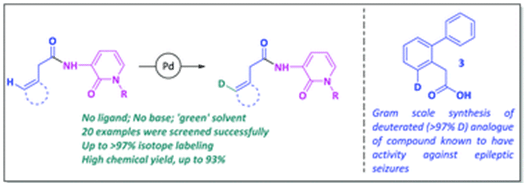

Priyadarshi Manna (TCGLS Member); Mrinalkanti Kundu (TCGLS Member); Ashis Roy (TCGLS Member);Susanta Adhikari
DOI : https://doi.org/10.1039/D1OB00663K
Abstract: The synthesis of deuterium-labeled organic compounds is of increased interest, especially after the approval of deutetrabenazine by the Food and Drug Administration in 2014. The selective incorporation of deuterium in the place of hydrogen not only represents uniqueness in terms of a novel chemical class, but it also can improve the pharmacokinetic profiles of drug molecules while retaining potency and other parameters; thus, hydrogen–deuterium (H/D) exchange methods have been proven to be powerful additions in different areas of chemical science. In that regard, metal-catalyzed deuterium labeling via C–H activation mediated by a unique inbuilt directing group (DG) can play a significant role in the synthesis of novel deuterated chemical entities. In this context, herein, we divulge our results relating to Pd(II)-catalyzed deuterium incorporation (>97%) at the γ C(sp2)-position of pyridone-containing phenylacetic acid derivatives, where 3-amino-1-methyl-1H-pyridin-2-one (AMP) not only acts as an efficient N,O-directing group, but it also constitutes a part of the target molecules of medicinal importance. Our methodology, which has been optimized based on the effects of temperature, catalyst, time, and substrate scope, shows advantages over existing protocols, with non-selectivity or meager deuteration or the use of an expensive metal (catalytic or super stoichiometric) and a deuterated solvent, reported previously for the deuteration of phenylacetic acid and its derivatives. Moreover, towards our aim of synthesizing deuterium-labeled biologically relevant compounds, the gram scale synthesis of a deuterated analogue of biphenyl acetic acid (3), known to have activity against epileptic seizures, has also been successfully accomplished in high yields and with excellent isotope enrichment via implementing this protocol.
